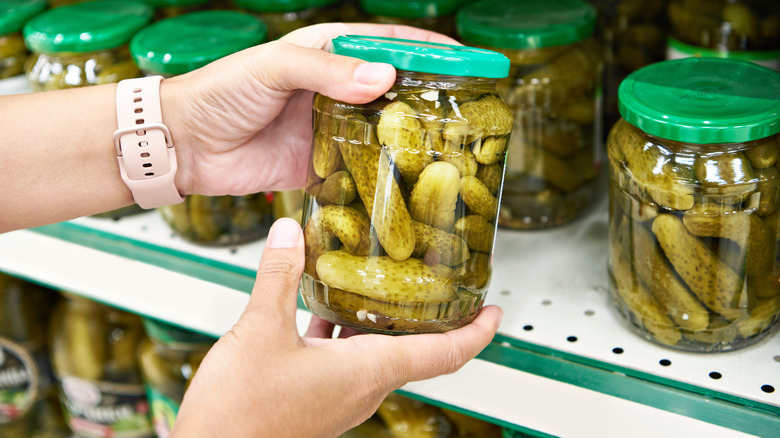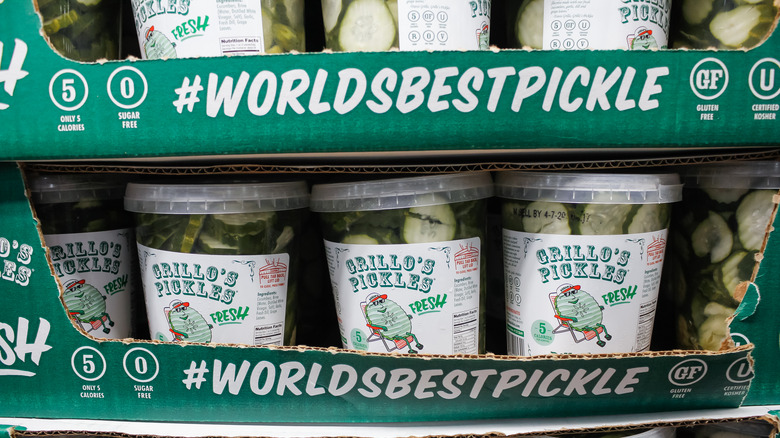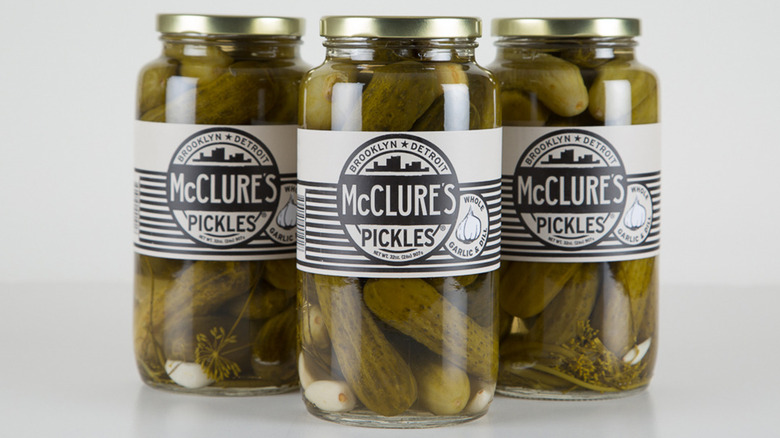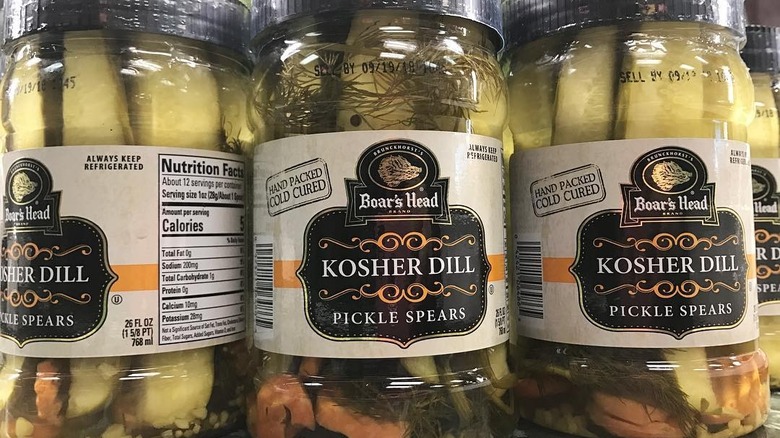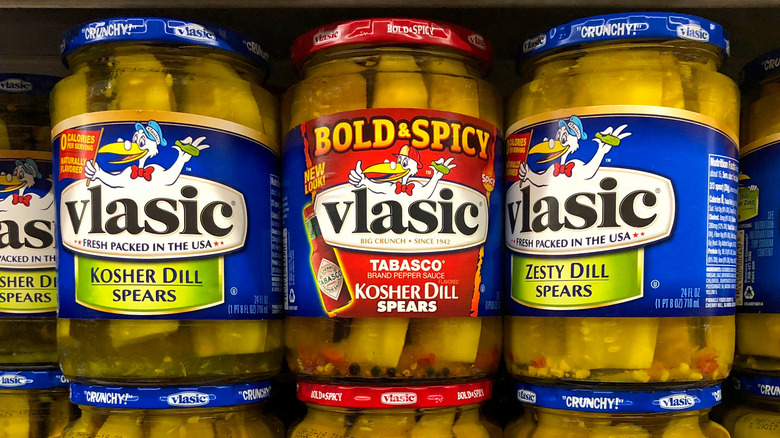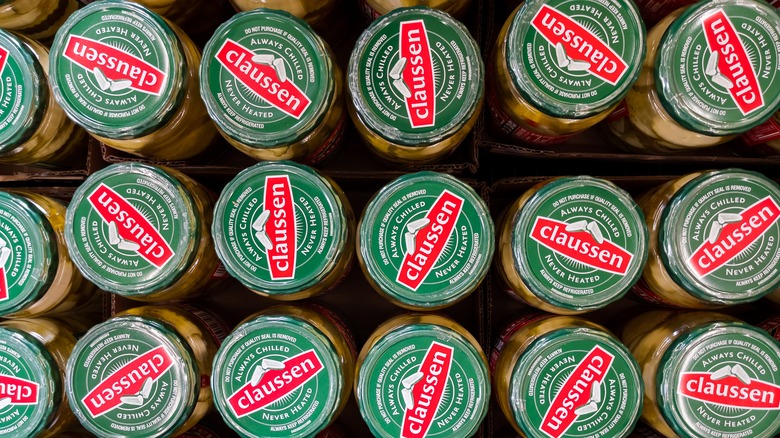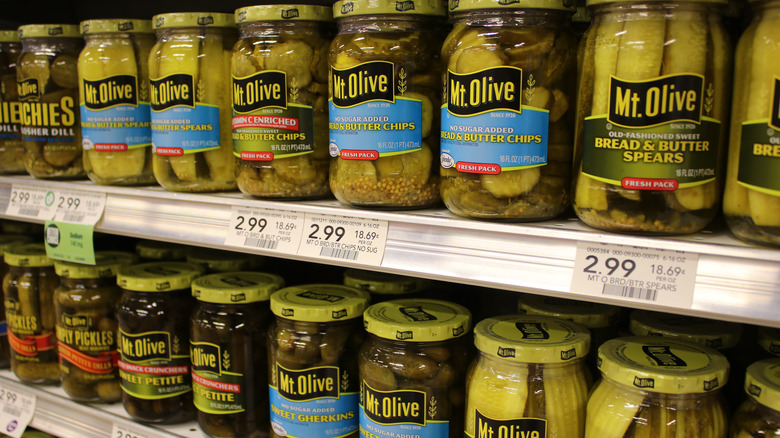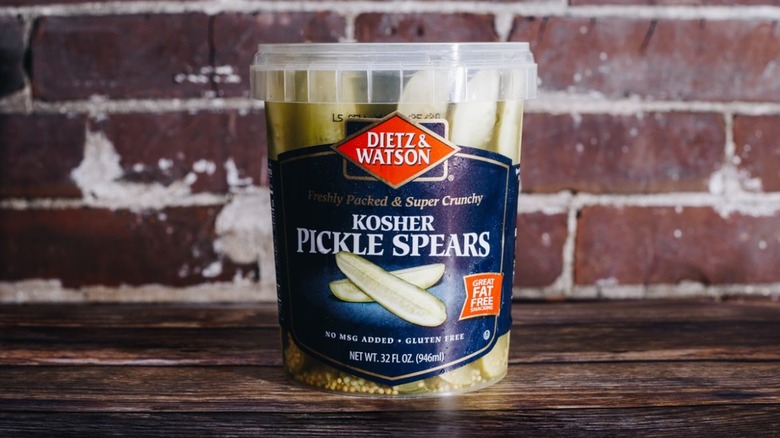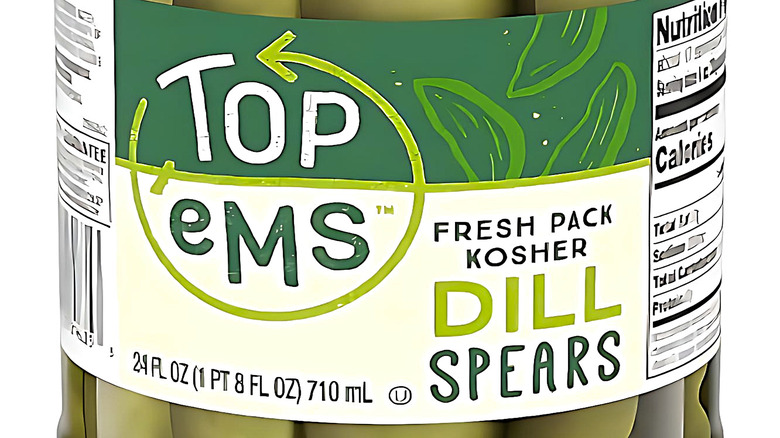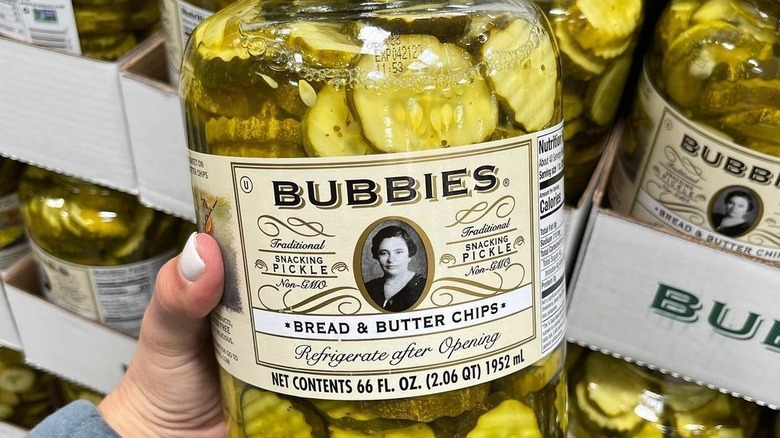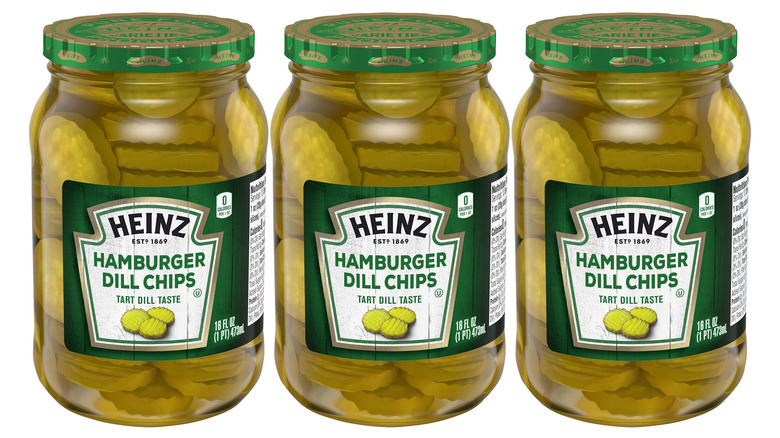5 Pickle Brands To Buy, And 5 To Avoid
We may receive a commission on purchases made from links.
Americans consume 2 billion pickles each year, which is enough pickles to reach the moon and back at least twice. Yelp predicts pickle will be the flavor of 2023 with searches for pickle-flavored foods up 55%. Today's vast array of pickle-enhanced delicacies (from ice cream to pickle-flavored hot sauce) only emphasizes an undying love for this classic condiment.
While the latest pickle-flavored possibilities may take a flavor craze to the extreme, the traditional dill variety has been trending since 2400 B.C. Cleopatra swore by a pickle-rich diet as one of her beauty secrets, and Napoleon's troops relied on pickles to keep them going. This life-affirming, health-enhancing delicacy hasn't changed much since ancient times, with a simple recipe that has used the same seasonings for thousands of years: garlic, salt, and dill.
While the baseline ingredients may be the same across millennia, there is a remarkable variation in how altering proportions affects pickle taste and texture, so we've compiled a list of today's best pickle brands to seek out. While pickling has reached no end of niche and artisanal markets, this is a list of brands that are easily attainable. We've selected supermarket varieties with defined flavor and crisp texture while ruling out those that rely on preservatives or chemical flavorings.
Buy: Grillo's
Ranked No. 1 in a blind taste test with Today and taking home best overall from Sporked, Grillo's Fresh Pickle Spears are lauded unanimously for their superior crunch and flavor. In 2019 it was ranked the No. 2 refrigerated brand in the country, and it attributes its success to a 100-year-old family recipe. Grillo's started small, with vegetables grown from a backyard garden. Now it operates on a much larger scale (with products available in big W grocery chains like Wegmans, Walmart, and Whole Foods) but still has that same homegrown flavor achieved by using simple, all-natural ingredients.
"We're changing the way pickles are manufactured because we're going garden to jar," founder and CEO Travis Grillo told Deli Market News. "We're not trying to preserve a pickle for a year. Everything is made to order, so it's as fresh as it gets."
While the dill spears are what have reached such notoriety, Grillo's also produces other unique products that all pickle aficionados should try. The brand's Pickle de Gallo one-ups salsa with its crunch and flavor, further enhanced with habanero and jalapeño. Grillo's recommends trying their PDG on sandwiches, burgers, and dogs, though it's a unique experience for the tastebuds all by itself.
Avoid: McClure's
McLure's pickles have consistently ranked low in blind taste tests, and have disappointed customers with an underwhelming, distinctly mushy texture. One Amazon reviewer declared, "...some of the worst pickles for crispness I have ever eaten, and I'm a pickle foodie." Another reviewer was disappointed to find that their jar of McClure's contained pickles that were soft, floppy, and disconcertingly slimy. This brand's products have been similarly critiqued for their flavor, which may be more vinegary than most pickle epicures might prefer.
In addition to a flavor that doesn't pack a punch and a texture that lacks a crunch, McClure's pickles are considerably pricier than many other supermarket varieties — the brand's 32-ounce jars run from $7.99 to $19.99 with various online retailers. Though McClure's pickles may tout a more artisanal process and identity with certified non-GMO products, customer reviews suggest unanimously that the pickles themselves are not distinct or delicious enough to justify the steep price.
Buy: Boar's Head
Boar's Head Kosher Dill Pickles have consistently ranked near or at the top in blind taste tests. In 2020, the brand was declared the winner by America's Test Kitchen and awarded "Best Whole Pickles" by Cook's Country. Hand-packed and cold-cured, these pickles have a strong snap and a bold flavor that toes the line between sweet and sour. These pickles have a subtle sweetness that enhances the other flavors present in the brine. If there's a secret ingredient that achieves this effect, it might be the carrots pickled in with the kosher dill spears, which offer a tangy crunch of their own.
"Kosher," when referring to pickles, is a distinction that has more to do with tradition than religious precedent. The primary ingredient that makes kosher pickles different from other varieties is the addition of garlic to the brine — a practice Jewish immigrants brought with them to New York in the 19th century.
Boar's Head dill pickles proudly emphasize notes of garlic and dill, making for a distinctive and nostalgic flavor reminiscent of the homemade and true to the traditional. Though Boar's Head has received awards for its kosher dills, the brand's emphasis on the slightly sweet also makes it a good choice if seeking out bread and butter pickles, which offer a satisfying balance of sweet and salty.
Avoid: Vlasic
Though this brand might be considered a classic (and may be recognizable as a barbecue staple), Vlasic's dill pickles are especially acidic. While some pickle fans may be partial to the throat-burning or gut-churning that comes from such a vinegary flavor, others have expressed disappointment in Vlasic pickles' soggy consistency. They might not quite make it into the category of "denture dills" — that is, pickles whose crunch is indiscernible, auditorily, and otherwise — but a more sure-fire way to get a satisfying crunch from this brand might be to try a bag of its vacuum-fried pickle chips instead.
While Vlasic has started producing jarred pickles with no artificial dyes (opting instead for turmeric as a natural color additive), the brand still uses chemical preservatives. Even if this may not be a deal-breaker for everyone, there are many other brands to choose from that don't rely on these artificial enhancements, making Vlasic a brand to skip past.
Buy: Claussen
Since being rated "No. 1 Refrigerated Pickle in America" in 1991, Claussen pickles have consistently been favored among pickle aficionados for their tangy flavor and optimal crunch. Though these pickles also contain the preservative Polysorbate 80, they undergo less processing than many other mass-marketed brands because they are produced under refrigeration. This method of production eliminates the need for pasteurization, which makes for fresher pickles, and could very well be what contributes to Claussen's sublime crunch and distinct flavor.
The crunch of a truly good pickle should be audible from 10 paces away, and Claussen's pickles might just pass this Audible Crunch Meter with flying colors. Self-proclaimed as the Original Refrigerated Pickle (the O.P.), after 150 years, Claussen has gained somewhat of a cult following. One Redditor reflects the brand's fandom with a highly favorable conclusion, saying, "Claussen pickles are the only good mass-marketed pickles in the U.S."
Avoid: Mt. Olive
Serious Eats described Mt. Olive's as "floss required" pickles, due to their tough skin that gets stuck in your teeth. Some variations within this brand may require a fair bit of chewing — the dill spears are especially difficult to consume if you're not eating them straight out of the jar. Though Mt. Olive's dill pickles were deemed "best for garlic lovers" by America's Test Kitchen, the strength of the garlic overpowers the dill. This gives this brand a non-traditional flavor and may leave you flustered trying to find ways to get rid of garlic breath.
Mt. Olive's garlicky flavor may be especially strong due to the addition of natural flavors included among the ingredients list. The "natural" distinction is deceptive, as these additives often contain artificial and synthetic chemicals. These simulated flavors are in addition to the numerous preservatives packed into each Mt. Olive pickle jar, making for a product that lacks authenticity when other pickle brands achieve better flavor without relying on chemical enhancement.
Buy: Dietz & Watson
Dietz & Watson pickles are considered a truly classic dill variety. One Amazon reviewer praised them as the best pickles ever for their strong flavor (even stating this brand is better than Claussen's — which may be a hot take). The customer also raved about the texture, saying, "They are crunchy and firm without being too hard."
This brand branches out from traditional dill with a variety of intriguing flavors to please all palates. Garlic lovers will enjoy the sour garlic variety (which isn't TOO overpoweringly garlicky), and the sweet horseradish flavor might tempt even bread and butter traditionalists.
The brine from any of these Dietz & Watson flavors would make for an especially piquant pickle juice snow cone. Dietz & Watson tubs are packed to bursting, for a good quantity-to-quality ratio, and can be found in the refrigerated grocery section, chilled for enhanced crunch.
Avoid: Top 'Em's
Top 'Em's is a brand with a confusing flavor. The dill variety, for example, has unusual notes of cinnamon that give an unnaturally sweet tinge to an otherwise savory pickle. The warm spice aftertaste puts Top 'Ems in a strange no man's land between dill and bread and butter no matter what the label on the jar says. This makes these pickles difficult to use as a condiment and unsatisfying to eat straight from the jar.
Fooducate barely gives this brand a passing grade due to Top 'Ems being so highly processed. The pickles are full of chemical flavoring and have artificial coloring. Yellow 5, a synthetic food dye used to make foods look more appealing, is among the ingredients in Top 'Ems pickle jars. A study published by Anticancer Research found this chemical compound has been linked to numerous allergies and health issues, including behavioral problems in children, and may potentially be carcinogenic. Due to the potential health risks involved, other pickle brands in recent years have swapped out Yellow 5 for turmeric as a natural color enhancer. Top 'Ems' continued reliance on harmful dyes makes this brand one to avoid.
Buy: Bubbies
Bubbies pickles are special for their distinction as fermented pickles, which means they are a natural source of probiotics in addition to having all the classic salty goodness. While pickles are often associated with other probiotic-rich condiments (like kimchi and sauerkraut), very few brands are truly fermented, and among them, even fewer are widely available in grocery stores.
The major difference between fermented and, well, pickled pickles is what is used to preserve them. While run-of-the-mill pickles are typically soaked in vinegar, fermented pickles achieve the same sour taste through a chemical reaction between natural sugars and bacteria that produces active cultures. Since fermented pickles do not contain vinegar, looking for that among the ingredients is an easy clue as to whether a jar of pickles might have probiotics or not.
Because of this fermentation process, Bubbies' kosher dill pickles are not shelf stable, which is why you'll find them in the refrigerated section of grocery stores. Though this brand is a little more expensive (about $7.99 per 33-ounce jar) the flavor and nutritional benefits are well worth the extra bucks.
Since the brine is what keeps Bubbies' pickles preserved, the brand notes that you should keep them submerged in the liquid until you've eaten the whole jar. And be sure to save the juice! There are plenty of creative uses for leftover pickle juice that Bubbies' brine would be especially good for because it is just as full of probiotics as the pickles themselves.
Avoid: Heinz
Though Heinz has had a long-standing history as the forerunner of American pickled products (H.J. Heinz himself was known as the "Pickle King"), it no longer stands up to other brands that offer better nutritional value and more distinct flavor. In a blind taste test, Serious Eats described Heinz dill pickles as "artificial tasting," which reflects the brand's ingredients, as Heinz pickle varieties across the board are loaded with preservatives and additives. Reviewers note that the preservatives definitely affect the pickle taste, so it's no wonder Heinz pickles don't have a satisfying authentic flavor.
Heinz whole dill pickles often come over-packed in jars, which crushes the crunch out of them and results in a softer, mushier, almost soaked texture. Some reviewers noted the price seemed a bit high, so it is probably best to skip Heinz pickles in the condiment aisle altogether and stick with the brand's ketchup instead.
